

Fish oil and omega-3s fats: How to be safer with your supplements. Everyone knows that fish oil is awesome.
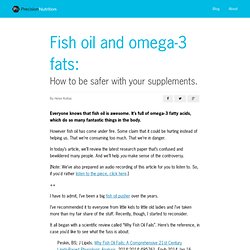
It’s full of omega-3 fatty acids, which do so many fantastic things in the body. However fish oil has come under fire. Some claim that it could be hurting instead of helping us. That we’re consuming too much. That we’re in danger. In today’s article, we’ll review the latest research paper that’s confused and bewildered many people. [Note: We’ve also prepared an audio recording of this article for you to listen to.
I have to admit, I’ve been a big fish oil pusher over the years. I’ve recommended it to everyone from little kids to little old ladies and I’ve taken more than my fair share of the stuff. It all began with a scientific review called “Why Fish Oil Fails”. Peskin, BS; J Lipids. This paper questions whether we need the essential fatty acids from fish in the first place. First, a little background To get me to question my own faith about fish oil, this research review must have been rock-solid … right? Not good. Ginger boosts testosterone levels in human study.
Ginger boosts testosterone levels in human study We recently wrote about just one of many animal studies which has shown that ginger supplementation boosts the testosterone level.
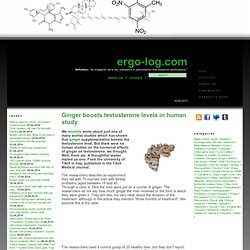
But there were no human studies on the hormonal effects of ginger on testosterone, we thought. Well, there are. A thoughtful reader mailed us one. From the university of Tikrit in Iraq, published in the Tikrit Medical Journal. The researchers describe an experiment they did with 75 married men with fertility problems, aged between 19 and 40. The researchers used a control group of 25 healthy men, but they don't report the data they collected from this group in the article. The supplementation raised the men's testosterone level by 17.7 percent. The concentration of the toxic malondialdehyde in the men's blood decreased and the concentration of the protective glutathione rose.
Both quantity and quality of sperm cells increased. Vitamin C and E supplements may hamper endurance training, study suggests. Vitamin C and E supplements may blunt the improvement of muscular endurance -- by disrupting cellular adaptions in exercised muscles, suggests a new study published today [3 February] in The Journal of Physiology.
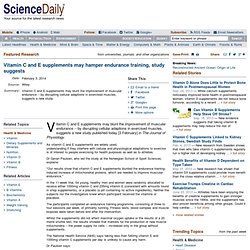
As vitamin C and E supplements are widely used, understanding if they interfere with cellular and physiological adaptations to exercise is of interest to people exercising for health purposes as well as to athletes. Dr Gøran Paulsen, who led the study at the Norwegian School of Sport Sciences, explains: "Our results show that vitamin C and E supplements blunted the endurance training-induced increase of mitochondrial proteins, which are needed to improve muscular endurance. " In the 11-week trial, 54 young, healthy men and women were randomly allocated to receive either 1000mg vitamin C and 235mg vitamin E (consistent with amounts found in shop supplements), or a placebo (a pill containing no active ingredients).
Magnesium. Introduction See Consumer for easy-to-read facts about Magnesium.
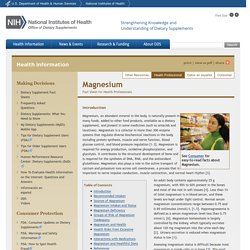
Magnesium, an abundant mineral in the body, is naturally present in many foods, added to other food products, available as a dietary supplement, and present in some medicines (such as antacids and laxatives). Magnesium is a cofactor in more than 300 enzyme systems that regulate diverse biochemical reactions in the body, including protein synthesis, muscle and nerve function, blood glucose control, and blood pressure regulation [1-3]. Magnesium is required for energy production, oxidative phosphorylation, and glycolysis. It contributes to the structural development of bone and is required for the synthesis of DNA, RNA, and the antioxidant glutathione. An adult body contains approximately 25 g magnesium, with 50% to 60% present in the bones and most of the rest in soft tissues [4]. Assessing magnesium status is difficult because most magnesium is inside cells or in bone [3]. Mark Hyman, MD: Magnesium: The Most Powerful Relaxation Mineral Available.
A deficiency in this critical nutrient makes you twice as likely to die as other people, according to a study published in The Journal of Intensive Care Medicine.
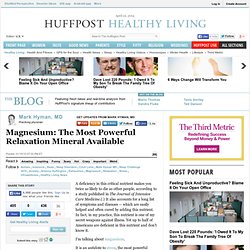
Magnesium and Its Health Benefits. By Dr.
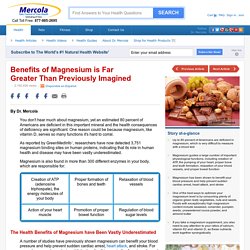
Mercola You don't hear much about magnesium, yet an estimated 80 percent of Americans are deficient in this important mineral and the health consequences of deficiency are significant. One reason could be because magnesium, like vitamin D, serves so many functions it's hard to corral.As reported by GreenMedInfo1, researchers have now detected 3,751 magnesium binding sites on human proteins, indicating that its role in human health and disease may have been vastly underestimated. Verde Go Drink Powder - Verde Go Nutritional Drink Mix - Aid Station. The effects of 8 weeks of whey or rice protein supplementation on body composition and exercise performance. Americans' vitamin D levels are highest in August, lowest in February, study shows. UC Irvine and Mayo Clinic researchers have found that vitamin D levels in the U.S. population peak in August and bottom out in February.
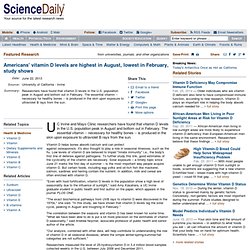
The essential vitamin -- necessary for healthy bones -- is produced in the skin upon exposure to ultraviolet B rays from the sun. Vitamin D helps bones absorb calcium and can protect against osteoporosis. It's also thought to play a role in seasonal illnesses, such as the flu. Low levels of vitamin D are believed to impair "innate immunity" i.e., the body's first line of defense against pathogens. To further study this link, good estimates of the cyclicality of the vitamin are necessary. The effects of six weeks of supplement... [J Int Soc Sports Nutr. 2012.